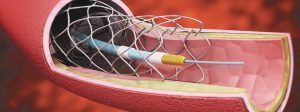By Heidi Smith, Contributor
 For Mohamed Morsy, M.D., FACC, FSCAI, RPVI, saving patients’ limbs and lives is all in a day’s work.
For Mohamed Morsy, M.D., FACC, FSCAI, RPVI, saving patients’ limbs and lives is all in a day’s work.
An interventional cardiologist, Dr. Morsy recently relocated to Venice from Memphis, Tenn. His expertise includes complex procedures on veins and arteries to treat heart attacks and prevent strokes and limb amputation.
“It was hard to leave Memphis where I have so many professional and personal relationships, but I’m excited to bring my skill set and experience to Venice,” said Dr. Morsy, who sees patients at ShorePoint Cardiology. “While the Venice area is rich in medical expertise, I have experience with complex interventions that are rarely offered except by major institutions.”
An example of a highly complex procedure that Dr. Morsy performs is chronic total occlusion percutaneous coronary intervention (CTO PCI). CTOs are blockages of arteries in the heart that have typically been present for more than three months. These blockages result from severe build-up of fatty deposits or plaque within the arteries (atherosclerosis) and are one of the complications from coronary artery disease.
When a patient has not responded to medicines or other interventions, a CTO PCI may be indicated. The procedure is performed by experienced cardiac interventionalists, such as Dr. Morsy, who have specialized training in advanced methods to treat CTO blockages.
Dr. Morsy earned his medical degree at the University of Alexandria in Egypt. He came to the United States to pursue research and his residency, then completed fellowship training in cardiology and interventional cardiology at the University of Tennessee Health Science Center. He is board-certified in several specialties, including interventional cardiology, internal medicine, cardiovascular disease, echocardiography, nuclear cardiology, cardiac computed tomography, and vascular medicine. To become board certified, physicians pursue specialty training and take rigorous exams administered by various medical boards.
Dr. Morsy also has extensive experience treating blood clots in the lung (pulmonary embolism), which can be a life-threatening condition. The condition is often treated with blood thinners, but some patients benefit from early intervention to remove or dissolve the blood clots.
While in Memphis, Dr. Morsy established a city-wide hospital program for treating pulmonary embolism by removing blood clots from lungs. Patients with life-threatening pulmonary embolism are assessed for level of risk and potential for emergency mechanical intervention, including disruption and removal of the blood clots, and restoration of adequate blood flow to the lungs. Five hospitals in the Memphis area have adopted the protocol to improve patient care.
More typical in his practice are interventions for patients with circulatory problems in veins and arteries in the leg, such as peripheral artery disease (PAD).
“If blood vessels become narrowed or blocked, the blood can’t flow normally, and patients may experience symptoms such as pain in leg muscles with activity, muscle cramps, constant burning pain when sitting or lying down (rest pain), or non-healing wounds and ulcers of the feet,” Dr. Morsy explained. “One of my passions as an interventional cardiologist and vascular specialist is treatment of critical limb ischemia, where the toe, foot or leg can be at risk for amputation. Our goal is not only to prevent those outcomes, but to restore the patient to a healthier and more active lifestyle.”
“Many risk factors for diseases of veins and arteries are lifestyle-related,” Dr. Morsy said. “That gives patients a great deal of power – and responsibility – to contribute to their own health and a long, active lifestyle.”
Keep Your Veins and Arteries Healthy
Many risk factors for PAD and other diseases of the veins and arteries are lifestyle-related. You can help prevent PAD by managing and reducing your risk factors.
• Don’t smoke.
• If you have diabetes, managing the condition is vital.
• Consume a low-fat, high-fiber diet to help keep cholesterol, triglycerides and blood pressure in a healthy range.
• Stay physically active.
Mohamed Morsy,
M.D., FACC, FSCAI, RPVI
Interventional Cardiologist
Shore Point
ShorePointMedicalGroup.com
(941) 497-5511









